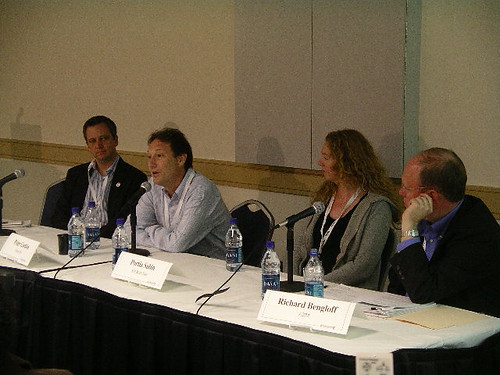Richard Bengloff President, American Association of Independent Music
Michael Bracy Policy Director/Co-founder, Future of Music Coaltion
Peter Gordon President, Thirsty Ear
Portia Sabin President, Kill Rock Stars

01:00PM EST - RB: According to SoundExchange, 37% of non-terrestrial radio spins are coming from independent artists. How are you finding it, Portia?
PS: What radio?
RB: There are two issues in radio: access and results. We're going to focus on results first. FMC recently received a grant from Rockefeller Philanthrophies, and that money was turned over to the New York State Music Fund. A2IM is going to be working with FMC to see what the results are over the next few years.
MB: Commercial broadcasters have been given a license to print money, but you have to follow the rules. Part of this is that you should not be able to turn your radio station into a poker game, where you have to ante in to play. A2IM was able to open the dialogue to what the market should look like. Where is the fair balance? This needs to be an on-going evaluation. We need to let the policy-makers now that the current settlement was not enough.
01:18PM EST - Questions from the audience
Q: Where does the settlement money go?
MB: In the NY decision, the money went to the NY State Music Fund, which I thought was great. I mean, that money went to underwriting a performance in Brooklyn of Lou Reed's Berlin. That's great.
RB: We are moving from a consumption-based industry model to a performance or service subscription model. There's got to be a model that monetizes this listening time.
Q: What do you think about SoundExchange asking for census reporting from stations?
RB: It would be great in a perfect world, but we're not there yet.
Q: Michael, Peter, as a call-to-action, what can I tell artists to do?
MB: The first thing is that artists need to feel that they own a piece of the airwaves. Indie artists like those we here represent, are everywhere except terrestrial radio. My easy answer is to write your congressperson.
PG: You can also supports groups like these, FMC and A2IM.

No comments:
Post a Comment